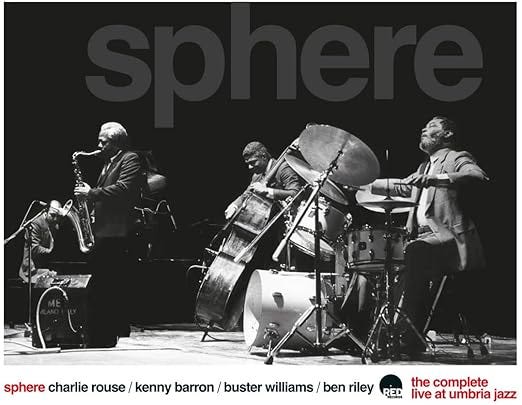Charlie Rouse – Sphere of Influence
Tenor saxophonist Charlie Rouse had a long career collaborating with many top flight jazz musicians including in his earlier years LPs with Clifford Brown, Benny Carter, Donald Byrd, and most notably, pianist and composer Thelonious Monk.
Rouse’s tenure as Monk’s saxophonist started in 1959, when Rouse participated in Monk’s “Orchestra at Town Hall” album for Riverside. Monk then recruited him for his working quartet, whose initial albums “5 By Monk By 5” and “Thelonious Monk at the Black Hawk” saw the foursome expanded with guest stars Thad Jones, Joe Gordon and Harold Land.
When Monk signed with Columbia Records in 1962, the quartet would permanently include Rouse on tenor saxophone and Ben Riley on drums, though the group’s bassist would change with regularity during the Columbia years.
Rouse quickly became an integral part of Monk’s sound starting on Monk’s first Columbia masterpiece “Monk’s Dream” and continuing through Monk’s classic albums “Criss Cross”, “Straight No Chaser” and “Underground”. In concert, when Rouse would solo, Monk would often get up from the piano and joyously dance around the stage as Rouse played - returning to the piano bench when it was time to take over.
After Monk’s retirement, Rouse joined with pianist Kenny Barron, bassist Buster Williams and fellow Monk alumnus drummer Ben Riley to form the group “Sphere” as a tribute band in homage to Monk (“Sphere” being Monk’s middle name).
Their first album, 1982’s ”Four in One”, consisted entirely of Monk tunes and was recorded literally on the day that Monk died (February 17th, 1982), though neither the group nor the label (Elektra/Musician) knew that the pianist’s passing would occur as they recorded the record. That first LP was something of a hit for Elektra/Musician, which led to a second LP (“Flight Path”) before the label folded a year or so later.
As time went on, Sphere would expand their repertoire to include original tunes by Rouse, Barron, Williams and others, but every set would invariably include at least one Monk tune - including a standout set captured at the Umbria Jazz Festival on July 14th, 1986 by Italy’s Red Records.
Originally issued in somewhat abbreviated form on LP as “Sphere – Live at Umbria Jazz” (1987) and on CD as “Pumpkin’s Delight” (1993), the complete concert has recently been fully re-assembled and released on a two LP vinyl set and two CD set as “Sphere – The Complete Live at Umbria Jazz”.
The concert starts off with Charlie Rouse channeling Monk in his solo tenor intro to bassist Buster Williams’ tune “Tokuda”. Like the second tune “Saud’s Sond”, the intro could have come of any of of Rouse’s distinctive performances with Monk in the 1960s.
“Saud’s Song” itself was composed by pianist Kenny Barron, whose strong solo here includes some sly Monk references, but nonetheless demonstrates his strengths as a soloist.
Buster Williams’ “Christina” offers a smooth contemplative ballad with exquisite interplay between Williams and Barron. The duo’s own set at this Umbria Jazz Festival appearance would also appear as it’s own Red Records set entitled “Two as One” (also highly recommended in it’s complete form two LP set from 2023).
Rouse’s own composition “Pumpkin’s Delight” and the previously unreleased performance of Monk’s “Trinkle Tinkle” are likely the highlights of this all-around excellent set. Rouse inhabited Monk’s music like no other player ever could, making his sound unique and instantly identifiable, no matter what the setting.
The set closes with another previously unreleased track “If I Should Lose You”. Originally written for a now-forgotten 1930s Western film, the composition later became a jazz standard with everyone from Charlie Parker in 1950 forward to Mulgrew Miller in 2006 putting their own stamp on it. Here Rouse and Barron lead the quartet into a strong version of a tune that originally appeared on Sphere’s “Flight Path” LP. This rendition finds the group stretching out on an extended performance of seventeen minutes of solos that would be difficult to top.
Wherever he may be, Monk must still be dancing.
-- Thank you for checking out Beyond Bop. Free subscribe to be notified of future columns.




